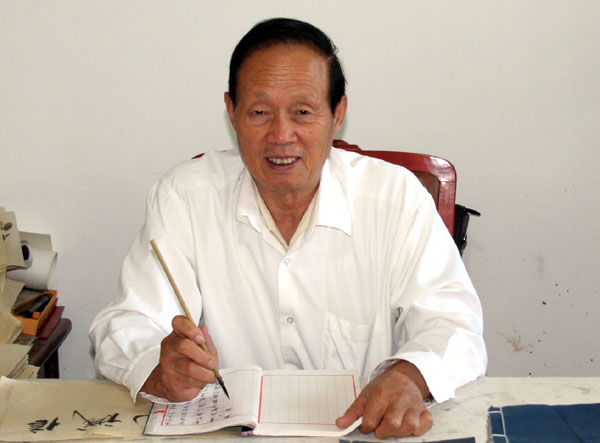Party seeks to boost ties with the public
'Mass Line' campaign targets corruption and bureaucracy, report He Na in Beijing and Zheng Jinran in Hebei province.
At first glance, Gangshang looks like any other village in China. An asphalt road connects it with the outside world and rows of single- and two-story houses line both sides of the main road.
However, on closer inspection you can see there are no security bars on the windows of the houses or village stores, and even bicycles are left unlocked.
Li Hailong, 26, said locks and chains are unnecessary because there are no thieves in the village and the residents always help each other in times of need.
Gangshang is an oasis of security in the countryside of Hebei province. The locals attribute that to their long-standing village Party chief Zheng Mengchen and the public books of merit in which he records good deeds.
 |
|
Zheng Mengchen, 66, Party secretary of Gangshang village for 30 years, has filled 183 notebooks with details of good deeds performed by local people. [Provided to China Daily] |
For his part, Zheng, 66, who has held the post for more than 30 years, said the situation is the result of excellent relations between the Party and the people.
The story goes back a long way. In 1982, Fan Zhenguo found a large bag of wheat, which was worth a lot of money in those days. However, instead of keeping it, the villager handed it to the authorities. In response, Zheng held a meeting where he publicly praised Fan and recorded his act in the book of merit. It was the start of a tradition of mutual aid that exists in Gangshang to this day.
Since then, no matter how trivial the deed, it's recorded and the benefactor is praised at a public meeting. So far, Zhang has filled 183 notebooks with details of civic responsibility and his mobile phone acts as a hotline for villagers to raise issues of local importance. The village committee visits local homes regularly to gauge public opinion before any major decisions are taken.
Gangshang, population 2,400, hasn't had a recorded crime in almost three decades, one of the factors that's attracted investment from more than 20 companies and helped to alleviate poverty.
Thirty years of change
Since Deng Xiaoping initiated China's opening-up and reform policy in the late 1970s, the country has become the world's second-largest economy, with a concomitant rise in the standard of living. The agricultural tax has been abolished, each child gets nine years of free compulsory education and a basic medical care system has been established that provides cover for almost the entire population. This has contributed to a durable relationship between the Party and the people. The number of Party members has risen from just 50 in 1921, the year the CPC was founded, to more than 85 million by the end of 2012.
However, places such as Gangshang remain the exception, not the rule. The CPC is faced with a complex balancing act as it looks to maintain its ties with the public, because the country's rapid economic and social development has resulted in conflicts between different social groups, mainly centered around official corruption and social inequity.
The problems have not gone unnoticed and at a conference in April the Political Bureau of the CPC Central Committee decided to launch the "Mass Line" campaign, providing guidelines under which CPC members and officials are required to prioritize the interests of the people and boost ties between the Party and the public.
On June 18, around two weeks before the 92nd anniversary of the founding of the CPC, Xi Jinping, China's top political leader, reaffirmed the importance of the mass line and stressed that public support is an issue that goes to the very heart of the CPC, its survival or extinction, reported the Xinhua News Agency. "Relations between the Party and the people face grave challenges, because undesirable elements such as formalism, bureaucratism, hedonism and extravagance are undermining those relations," Xi was quoted by Xinhua as telling the conference.
The main task of the yearlong campaign is to establish a new working style and undertake a "thorough cleanup" of damaging elements, which have been dubbed the "four undesirable work styles". The campaign will focus heavily on officials at or above county level.
Related stories:
Officials urged to promote 'mass line' campaign
Xi urges CPC members to keep China red
'Mass line' campaign shows CPC's determination
CPC's 'mass line' campaign not a short-term movement
N China farmers get help from govt officials
Special coverage:
Registration Number: 130349



























